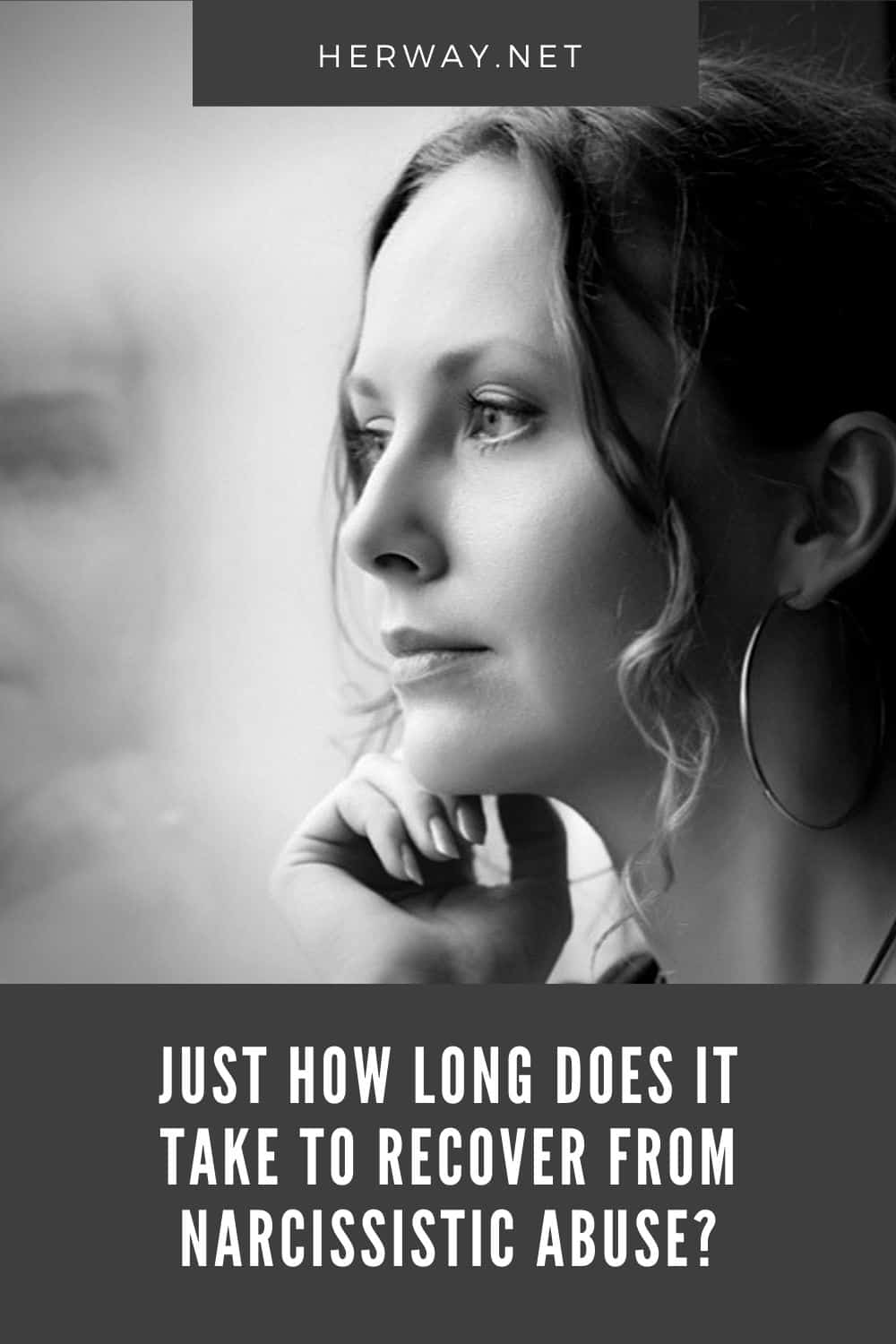¿Cuánto tiempo se tarda en recuperarse de un abuso narcisista?
Recuperarse de un trauma bono caused by narcissist abuse is a difficult path to tread. It’s a healing journey that takes time, effort and energy.
Pero ¿cuánto tiempo se tarda en recuperarse de abuso narcisista?
This is a question all victims ask themselves. There you are, struggling for months or even years but you are still not fully recovered, so it’s natural to wonder when you will finally get there.
Before anything else, you have to be aware of one thing. This is a long path toward recovery and you can’t expect any magical improvement overnight.
En cambio, se necesita mucho tiempo, esfuerzo y energía para deshacer el impacto que su abusador narcisista dejó en su salud mental y personalidad. Sin embargo, se puede hacer con el sistema de apoyo adecuado.
Cuando pregunte a expertos doctores cuánto tiempo se tarda en recuperarse de un abuso narcisista, le dirán que el tiempo medio que necesita una víctima para curarse es de doce a dieciocho meses.
No obstante, también señalarán que hay ciertas fases por las que toda víctima pasa durante su viaje.
Denegación

You’ve heard about narcissistic and toxic people and you know that such a thing as narcissistic abuse exists out there. However, like the rest of the world, you are convinced that this can’t happen to you.
So, naturally, you deny everything you’re going through at first. You simply refuse to accept that you, of all people, have become a victim of abuso narcisista.
All the red flags are there but you keep convincing yourself that you’re not seeing them right. Maybe you’re exaggerating. Maybe your abuser is not so bad after all.
It’s possible that you’re just being too sensitive.
There is no way in hell that you’ve spent all this time with someone so toxic and essentially evil. You would have seen the signs earlier.
Puede que tus mejores amigos y tus familiares más cercanos intenten abrirte los ojos, pero nada ayuda.
Of course, the fact that your narcissist keeps on gaslighting you and making you look like the crazy one doesn’t help.
However, the thing is that this stage is good, despite the denial. It means that you’ve started reconsidering your narcissistic relationship and finally begun doubting it.
This is the start of something bigger; the start of your long and difficult healing journey. Nevertheless, this is crucial because it’s some kind of progress.
You’ve finally moved from the dead spot and you’ve stepped onto the right track.
Culpa

When you’re wondering how long does it take to recover from narcissistic abuse, you have to be aware of one thing.
This healing isn’t linear and it has its ups and downs.
You would probably expect acceptance to come right after denial. However, sadly, things don’t work in such a simple manner.
De hecho, tras la fase inicial, empiezas a sentirte culpable. Al principio, te culpas a ti mismo incluso por acusar a tu pareja de narcisista.
Al cabo de un tiempo, cuando empiezas a investigar más sobre los rasgos narcisistas de la personalidad y una vez que reconoces la mayoría de ellos en tu pareja, también te sientes culpable.
Guilt attacks you from different directions. You can’t believe that you were so foolish to get involved with this kind of sociópata tóxico.
How come you didn’t see the signs before? How could have you been so stupid not to recognize the red flags which were so obvious?
Most importantly, how is it possible that you’ve stayed next to this person for so long? When did you lose all of your self-respect?
¿Cómo pudiste permitir que te trataran así durante todo este tiempo? ¿Te perdiste por completo?
These are all the questions running through your head. Instead of putting all the responsibility on your abuser because they’re the only one guilty, you do the opposite.
You see, you’ve been so brainwashed to the point that you even blame yourself for being their victim.
Puede que ahora no lo veas, pero este también es uno de tus intentos subconscientes de absolverles de toda culpa.
Ira

La siguiente etapa también consiste en emociones negativas y la predominante es la ira.
You’re still not ready to process your pain and everything you’ve been through so, it’s much easier for you to be angry; angry at your abuser, angry at yourself for choosing them and for staying with them and angry at the universe for putting you in this situation.
It’s much easier to admit that you’re angry than accept that you’re hurt and heartbroken.
En este punto, se puede decir que incluso odias tu abusador. Quieres que pasen por lo mismo que pasaste tú.
Quieres vengarte. Tramas tu venganza y lo único que consigue calmarte es imaginártelos sufriendo emocionalmente.
Most victims don’t actually do anything about this. However, they do think about revenge since it becomes their defense mechanism.
You assume that this is the only way to regain your confidence and dignity. The abuser has to suffer the same way you did and that’s the only way for you to stop feeling humiliated.
Créeme, la ira nunca es mejor que la tristeza. De una forma u otra, sigues sintiendo algo por tu narcisista.
Besides, revenge won’t heal your broken heart. It might repair your crushed ego but that won’t magically erase all of your deeply rooted traumas.
Negociación

This is probably the last thing you expect when you’re trying to figure out how long does it take to recover from narcissistic abuse but after anger there comes a stage called bargaining.
Antes de esta fase, estabas decidida a hacer todo lo que estuviera en tu mano para herir a tu agresor. Los odiabas y decidiste no volver nunca con ellos.
At least, that is what you thought went on but actually, the truth is different. In fact, you’re still very much labile and the biggest proof of your instability is the fact that you slip back into hope.
It’s completely unexpected but you start to bargain with yourself about the ways to help your narcissist.
Intentas huir de ella, pero la rabia inicial desaparece y ahora surge la esperanza; esperanza de que esa persona cambie, esperanza de que puedas ayudarla y esperanza de que tu relación narcisista tiene una salida.
Piensas en todos los "y si...". Consideras todo el potencial que tiene tu narcisista y todo lo que podría llegar a ser si aceptara hacer algunas ligeras modificaciones en su personalidad.
It is likely that you’ll revive contact with your abuser during this time. Naturally, this doesn’t help your proceso de recuperación.
What you mustn’t forget is that these toxic people are skillful manipulators and it’s expected for them to try and turn the tables.
De hecho, existe la posibilidad de que su agresor haga todo lo posible por representarse a sí mismo como su víctima.
On a conscious level, you’ll never believe them. However, deep down, you will want to let them back in in your life and therefore, you’ll have the desire to accept their excuses.
La fase de no contacto

I won’t lie to you, this will probably be the most difficult stage of your marathon recovery process.
Después de todo, este es el primer movimiento real que haces hacia tu narcisista, ya que todos los anteriores tuvieron lugar en tu cabeza y en tu corazón.
Cuando quieras escapar de tu relación abusiva y te estés preguntando cuánto se tarda en superar un abuso narcisista, lo más importante es cortar todos los lazos con tu abusador e irte ningún contacto.
Ten en cuenta que esta persona sufre un grave trastorno narcisista de la personalidad, así que olvídate de la idea de mantener una relación amistosa con ella.
I won’t lie to you; there is no civilized way of doing this. You won’t be able to explain to them in a nice way that you want out and there is no ‘seeing them just once for the last time’.
Instead, you’ll just have to move as far away from them as possible. Block their social media accounts, cut ties with all of your mutual friends and it will probably be necessary to change your number.
Esto será más difícil si tiene un relación tóxica with a narcissistic parent, a co-worker or a spouse that you’ll have to keep on co-parenting with.
Al fin y al cabo, son las personas con las que tienes que mantener algún tipo de contacto.
If this is a co-worker or a co-parent, please limit your communication to work or kids-related topics and don’t engage in any other conversation.
On the other hand, if we’re talking about a narcissistic parent, please forget about your family ties and guilt.
You’re an adult and you can and must cut ties with them, despite your blood connection.
En cualquier caso, lo más importante es ignorar al narcisista en la medida de lo posible.
I know that you will probably have the urge to fight with them and call them out on their actions but trust me—that won’t get you anywhere.
You see, a narcissistic supply depends on your reaction. It doesn’t matter what kind of reaction we’re talking about; for them, it’s enough to notice that they’ve managed to get to you.
That is exactly why you have to pretend that they don’t exist. Be as boring as possible to your abuser and eventually, they’ll give up on you.
Of course, that won’t magically heal their NPD. Unfortunately, they’ll just move on to their next victim but there is nothing you can do to change that.
Volver a levantarse

After you’re done with the previous stage, better times are coming and you’re slowly figuring out how long does it take to heal from narcissistic abuse.
Now you’re finally free to pick yourself up from the ashes that this abuso emocional te ha hecho pasar.
Esta es la fase en la que tienes que aprender a quererte de nuevo. La fase en la que tienes que ponerte en primer lugar y la fase en la que se trata de recuperar la autoestima.
Básicamente, lo que tienes que hacer es volver a empoderarte. Trabaja en ti misma y, lo más importante, mantente lo más ocupada posible.
No, your narcissistic abuser won’t magically fade away from your mind but it’s your job to work on kicking them out of there.
A lot of victims of narcissistic abuse don’t have what it takes to go through all of this alone. Instead, they need a support system that includes help from their loved ones or from professional experts.
Please, don’t hesitate to ask for help.
You’re not weak, you’re dealing with a person who suffers from a severe narcissistic personality disorder and it is only natural that you can’t get away from their clutches by yourself.
Existen numerosos grupos de apoyo para víctimas de abuso narcisista, donde podrás escuchar montones de historias de personas que han pasado por los mismos traumas que tú.
This will help you see that you’re not alone. You’re surrounded by your loved ones and by others who are willing to help you.
Reconstruir su identidad

Una de las partes más difíciles de la recuperación del abuso narcisista es reconstruirte a ti mismo.
Su ex narcisista borró la personalidad que tenías antes de conocerlos y el vínculo traumático que te unió a ellos cambió la esencia de lo que eres.
Así que ahora es el momento de encontrar a la persona que fuiste en el pasado.
I’ll be honest here; this traumatic experience will leave traces on your mental health. With time, your emotional wounds will eventually heal but the scars will remain forever.
No, this doesn’t mean that you’re broken beyond repair; I’m just trying to tell you not to hope that you will go back to being exactly the same person you were before this person marched through your life.
However, what you have to do is to rebuild a new identity, an identity that won’t be dependent on your abuser but which also won’t be the same as the one you had before them.
The hardest part is having to reinvent yourself. After all this time, you lost track of who you are. What are the things you like and don’t like about yourself?
¿Qué rasgos son realmente tuyos y cuáles creaste para ser más atractivo para tu narcisista?
Comprobación de la realidad

A pesar de lo que puedas pensar, durante todas estas etapas, tu abusador narcisista sigue estando muy presente en tu mente y en tu corazón.
Todavía hay momentos en los que sientes ganas de rendirte y en los que aparecen rayos de esperanza de que tu ex narcisista pueda cambiar y que se tus almas gemelas.
Sin embargo, esta es la etapa en la que por fin te quitas las gafas de color de rosa. Después de tanto tiempo, por fin ves la realidad en su verdadera forma.
You stop making excuses for your partner’s toxic behavior. You no longer justify the narcissist abuse and you stop blaming yourself for everything that went on.
You no longer hope that they’ll become an empath or a kind person.
You understand that they suffer from a serious mental illness, that they need help and that you can’t do anything about it.
At first, this reality check is quite painful. However, as time goes on, it brings you liberation. Finally, you’re freed from this person’s chains.
You realize that their behavior patterns are not normal and that you shouldn’t expect the same treatment from everyone else in your surroundings.
If we’re talking about an ex-romantic partner you’ve been trying to escape from, this is also the time when you might start dating again.
El optimismo se despierta en tu interior y, por primera vez, ves una luz al final del túnel.
However, I’ll have to ask you to be extremely careful when it comes to rebound relationships. You’re still extremely fragile and you could easily fall for someone’s love bombing all over again.
Aceptación y perdón

After reality hits you hard in the face, it’s time to accept and forgive and first of all, you stop looking for closure. You understand that you’ll never get the explanation you crave.
La conclusión es que no hay ninguna razón lógica para que todo esto haya sucedido.
At the same time, you no longer try to run away from your past. You don’t let it define you but you know there is no point in trying to escape something that is a part of you.
Y lo que es más importante, comprende la importancia de perdón. You don’t forget everything you experienced but you do forgive.
First and foremost, you forgive yourself for all of your wrong choices and you understand that you’re not crazy or stupid.
Fuiste víctima y la víctima nunca tiene la culpa. Aceptas tus errores, sin permitir que te hagan dudar de tu autoestima.
Finally, you manage to find the strength to forgive your narcissistic abuser. You don’t want them back, not even if your life depended on it, but you forgive them.
Now, you’re smart enough to know that your resentment and grudges are only harming you.
You realize that the only way to truly free yourself from this person’s impact is to let go of anger and all other negative emotions.
Es entonces cuando te vuelves indiferente y cuando consigues deshacerte de ellos.
Lecciones aprendidas

When you’re wondering how long does it take to recover from narcissistic abuse, you usually forget about what comes afterward.
Olvidas una cosa importante: las lecciones que te ha enseñado esta relación narcisista.
Only once you see that you’ve learned something from this awful experience can you tell that you’re fully recovered.
First and foremost, you’ll learn to put yourself in first place and you’ll start to worry about your own well-being and mental health.
You’ll see your self-worth, you’ll engage in self-care and you’ll learn to love yourself more than anyone else.
Also, you’ll build your self-esteem to unimaginable heights. You’ll understand that you’re your own soul mate and that you don’t actually need anyone to emotionally depend on.
Most importantly, this relationship will teach you what love is not. You’ll learn to recognize things such as bombardeo de amormanipulación y otras tácticas que los narcisistas utilizan para atraer a sus víctimas.
Esta experiencia es dolorosa, de eso no hay duda. Sin embargo, también es valiosa, ya que te hará más fuerte que nunca.








